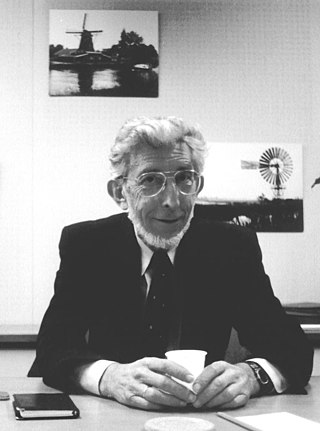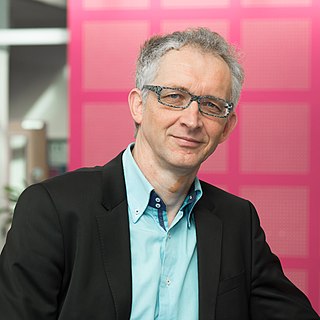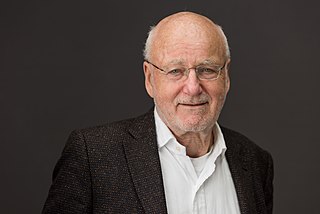Related Research Articles
In business administration, absorptive capacity has been defined as "a firm's ability to recognize the value of new information, assimilate it, and apply it to commercial ends". It is studied on individual, group, firm, and national levels. Antecedents are prior-based knowledge and communication. Studies involve a firm's innovation performance, aspiration level, and organizational learning. It has been said that in order to be innovative an organization should develop its absorptive capacity.

Erasmus University Rotterdam is a public research university located in Rotterdam, Netherlands. The university is named after Desiderius Erasmus Roterodamus, a 15th-century humanist and theologian.
Complexity theory and organizations, also called complexity strategy or complex adaptive organizations, is the use of the study of complexity systems in the field of strategic management and organizational studies. It draws from research in the natural sciences that examines uncertainty and non-linearity. Complexity theory emphasizes interactions and the accompanying feedback loops that constantly change systems. While it proposes that systems are unpredictable, they are also constrained by order-generating rules.
George Yip is Emeritus Professor of Marketing and Strategy at Imperial College Business School, London. Former professor and Co-Director of the Centre on China Innovation at China Europe International Business School (CEIBS). Other academic positions at Harvard, Georgetown, UCLA, Cambridge, London Business School. Now living in Boston and Maine, USA, and London. Former Dean of Rotterdam School of Management, Erasmus University. His book, Total Global Strategy: Managing for Worldwide Competitive Advantage was selected as one of the 30 best business books of 1992 by Soundview Executive Book Summaries. Also, author or co-author of Pioneers, Hidden Champions, Change Makers, and Underdogs: Lessons from China's Innovators (2019), China’s Next Strategic Advantage: From Imitation to Innovation (2016), Strategic Transformation (2013), Asian Advantage: Key Strategies for Winning in the Asia-Pacific Region (1998), and Total Global Strategy. Over 10,000 citations on Google Scholar. He serves on the editorial advisory boards of California Management Review, LRP and MIT Sloan Management Review. Boards of Hewnoaks Artist Colony (Maine) and MassOpera and Board of Advisors of Boston Lyric Opera. Chair of Research Advisory Committee, SKEMA Business School, France. Former board member of IDM, Glunz AG, Arlington Capital Management and Data Instruments, Inc., former advisory board member of Sonae SGPS and American University of Cairo Business School
The Tinbergen Institute is a joint institute for research and education in economics, econometrics and finance of the University of Amsterdam, the VU University Amsterdam and the Erasmus University Rotterdam. The institute was founded in 1987 and is named after the Dutch economist Jan Tinbergen, a Nobel prize-winning professor at the Erasmus University Rotterdam.

The Duisenberg School of Finance (DSF) was an educational organization in the Netherlands which offered Master's level education in finance between 2008 and 2015. The school was initiated as a collaborative initiative of the Dutch financial sector with local and international academic institutions. Amongst others, the founders of the initiative were Nout Wellink and Minister of the Economic Affairs, Maria van der Hoeven. The name was chosen by the founders to honor Wim Duisenberg, the first President of the European Central Bank.
E.J.J. (Hans) Schenk is a Dutch professor emeritus of economics and fellow of the Tjalling C. Koopmans Research Institute at Utrecht University’s School (NE) of Economics (USE) of which he was founding director. He was a Crown-appointed independent member of the Social and Economic Council SER of the Netherlands from 2010 until 2018. With other financial economics specialists, and help of Triodos Bank, he founded the Sustainable Finance Lab in 2011.
Organizational ambidexterity refers to an organization's ability to be efficient in its management of today's business and also adaptable for coping with tomorrow's changing demand. Just as being ambidextrous means being able to use both the left and right hand equally, organizational ambidexterity requires the organizations to use both exploration and exploitation techniques to be successful.
Hein Schreuder is a Dutch economist and business executive, former executive vice-president corporate strategy & acquisitions at DSM and former professor at the University of Maastricht. especially known for his work on "Economic approaches to organizations" with Sytse Douma and for his role in the (second) transformation of DSM.
Paul Matthyssens is a Belgian organizational theorist, management consultant, and Professor in Strategic Management and Global Strategic Management at the University of Antwerp, Department of Management, and at the Antwerp Management School. known for his work of service-oriented strategy. Since his retirement in 2020 from the Anwerp Management School, Paul Matthyssens is Professor of Management at the Department of Economics, Management and Statistics of the University of Milano-Bicocca.

Jan in 't Veld was a Dutch aerospace engineer and professor of industrial organization at the Mechanical Engineering Department of the Technical University of Delft. In the Netherlands he was one of the pioneers of the application of systems theory in business administration and management.
Antonius Cornelis Joannes (Ton) de Leeuw is a Dutch organizational theorist and Emeritus professor of business administration at the University of Groningen, known for his contributions in the field of systems theory and methodology applied to business administration, management and innovation.
René Wijnand Wagenaar was a Dutch academic, and Professor of Information and Communication Technology at the Faculty of Technology, Policy and Management of the Delft University of Technology, known for his work on Modular Network Design and shared service centers.
Walter Julius Michael Kickert is a Dutch academic, and Professor of Public Management at the department of Public Administration, Erasmus University Rotterdam, known for his work on "Public policy and administration sciences in the Netherlands."

Johannes Willem "Johan" Schot is a Dutch historian working in the field of science and technology policy. A historian of technology and an expert in sustainability transitions, Johan Schot is Professor of Global Comparative History at the Centre for Global Challenges, Utrecht University. He is the Academic Director of the Transformative Innovation Policy Consortium (TIPC) and former Director of the Science Policy Research Unit (SPRU) at the University of Sussex. He was elected to the Royal Netherlands Academy of Arts and Sciences (KNAW) in 2009.
Cornelia Wilhelmina (Mineke) Bosch is a Dutch historian born in South Africa. She is Professor of Modern History at the University of Groningen in the Netherlands.
Ambidextrous leadership is a recently introduced term by scholars to characterize a special approach to leadership that is mostly used in organizations. It refers to the simultaneous use of explorative and exploitative activities by leaders. Exploration refers to search, risk taking, experimentation, and innovation in organizations, whereas exploitation has to do with refinement, efficiency, implementation, and execution. Successful ambidextrous leaders must be able to achieve the appropriate mix of explorative and exploitative activities, unique for each organization, that will lead them to high firm performance outcomes.
In business administration, desorptive capacity has been defined as "an organization’s ability to identify technology transfer opportunities based on a firm’s outward technology transfer strategy and to facilitate the technology’s application at the recipient". It is considered as a complement to absorptive capacity, and it may be a driver of a successful knowledge transfer.

Bob Löwenberg is a clinical hematologist/investigator. He is Professor of Hematology at Erasmus University Rotterdam.
References
- 1 2 3 Prof.dr. Henk Volberda Archived 2014-08-10 at the Wayback Machine at Rotterdam School of Management.
- ↑ Henk W. Volberda Google Scholar profile.